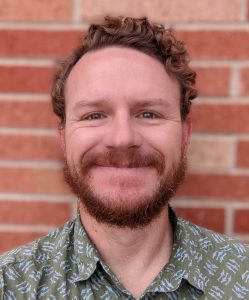Community College Language Professor
Maxwell von Gunten

Eric Atkins
Professor of Spanish (Casper College)
Spanish MA with a Focus in Literature
Spanish
Eric Atkins has been a professor of Spanish at Casper College for a little over a decade. He graduated with a Spanish MA from the University of Wyoming; however, following his Master’s program, rather than starting his career in education, Atkins pursued a business venture in Mexico. He mentioned it was a deviation from his path to teaching but an opportunity to be immersed in the target culture. He also realized just how much he did not want to be in business, and found his love for education. He said, “In the process of finding your career as a bilingual, you tease out some different interests.”
He later returned to his roots in Casper, Wyoming. As a Spanish professor at Casper College, he has freedom with the curriculum, a supportive dean that champions world languages, and small class sizes that promote deep and lasting bonds with students. His cultural knowledge and love for education earned him the Wyoming Foreign Language Teachers’ Association —Teacher of the Year award in 2016.
Currently, Atkins creates abroad programs in whatever form they might take. He has taken students and alumni to countries in Latin America, Spain, and even Portugal. As a former student of his, I can attest that I found a deeper connection and bond to the Spanish language because of the depth and breadth of knowledge Atkins gained through immersion.
Question & Answer
How has Atkin’s ability to communicate and work with people from different cultural backgrounds been useful or important for a career in education?
Atkins thinks there are many different ways in which having the ability to communicate and work with people from different cultural backgrounds has benefited him as a professor. He said, “In order to communicate with people that come from these different cultures and countries, you have to know the language—obviously. And in doing so, you have the ability to make more authentic connections.”
Atkins has a colleague and friend from Columbia. Through their continued relationship and interactions, he is able to create connections for his students with personalized knowledge about his friends’ culture and language.
How have Atkins’ language and cultural skills supported and/or enhanced his opportunities in education?
After finding his way into education, Atkins acquired language and classroom skills that opened many new doors. He received offers to work in Chile and Columbia but eventually decided to work in Mexico. Even while working in Mexico, he still received offers from people he met both professionally and personally because of their language connection. He had offers for positions in education, but also from other fields which he did not always have the necessary credentials for. He stated, “There are lots of unexpected opportunities with language and cultural skills.”
What are some other skills that are important for success in education?
As an educator, Atkins has worn many different hats, he expressed, “Sometimes you are acting as a coach for your students by encouraging and directing them. At other times you’re a champion of their cause and trying to help them accomplish their goals. And also a listener because your students will share the challenges they face outside of their education.”
Another skill that Atkins felt was important was learning how to collaborate with people in different fields and trying to find connections in what you do and what they do, he commented, “As disparate as that sounds” with a chuckle. He added that this can always be beneficial and offer different perspectives and approaches in any career.
You also have to find a way to make the material that you are teaching interesting, thus Atkins has found that there is an entertainment component to education in order to keep students engaged and willing to come back. He mentioned, “When you start looking at numbers in higher education, there are fewer and fewer students that are staying in college, or think that the education itself is valuable. In a sense you have to be a salesman. It sounds a bit cynical, but in order to keep your program viable and hook people into it this skill can help.”
He also mentioned that as a former student of a language, it is important to empathize with the students and their struggles as learners. Atkins is always looking to find different and improved ways to teach concepts that were difficult for him as a learner.
What did Atkins do to prepare for a career in education?
Atkins reflected, “There is the official preparation for becoming an educator where you complete your degree program and take all the courses, but there is also the world and cultural knowledge you develop while going through education.” He had the opportunity to study and teach abroad which allowed him to take the foundations he had studied in the classroom and apply them to real world contexts and situations. Then after developing his classroom knowledge, he could create engaging lesson plans for students by combining the theoretical and practical components of language acquisition.
Is it necessary to teach at secondary education level prior to seeking a career in higher education?
From Atkins’ experience, it is not necessary to teach at this level before seeking employment as a professor. Although he did mention it can help to teach at these levels because it is an opportunity to experience the transition between language learning levels—where learners are coming from and where they are needing to go—which can create a deeper insight as to a student’s zone of proximal development.
He reiterated, “It is not a deal breaker. You can learn about this progression of proficiencies without having to go through the ‘trenches’. As I think about some of my colleagues, many of them haven’t taught in secondary education.”
What are some professional organizations that are useful for students seeking jobs in world language education?
“There are several official job posting sites, such as HigherEdJobs.com and The Chronicle of Higher Education. There is also a professional organization posting jobs that specifically focuses on foreign language advocacy, workshops, and other tools for educators called The American Council on the Teaching of Foreign Languages (ACTFL). ACTFL posts jobs for all positions ranging from middle and high school all the way up to higher education.”


